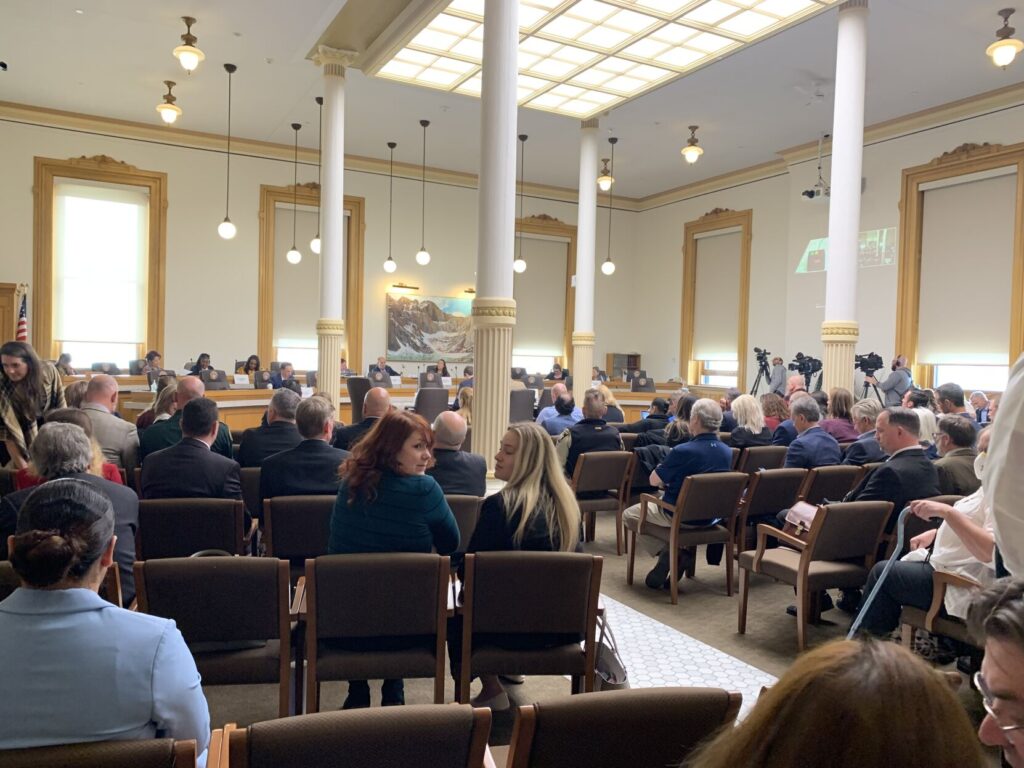Metro Denver real estate agents strive to interpret NAR settlement
Spring typically marks high tide for the residential real estate market, according to Colorado agents. And this spring — with a low inventory of homes available to meet buyer demand — is no exception.
Right now, brokers working that market are experiencing some added anxiety as they struggle to interpret a $418 million settlement by the National Association of Realtors (NAR) last week, following an antitrust lawsuit in federal court that had targeted NAR and some large, national real estate agencies over commissions.
The big change spelled out by that settlement is to prohibit agents who represent home sellers from specifying a cooperative commission for a buyer’s agent in a home’s listing. The change purports to avoid a conflict of interest, in which an agent might show only those houses with favorable commissions, rather than representing their client’s broader interest.
When the terms take effect in mid-July, co-ops would still be allowed, but would be negotiated rather than specified in on-line listings operated by NAR and by brokerages.
National media were widely interpreting the concessions as marking a victory for consumers that would augur for cost savings in fees and commissions paid by homebuyers and sellers.
But Colorado agents, who have long worked under state guidelines that require strict disclosures of broker commissions, were calling the headlines misleading.
“I’ve been a realtor for 33 years, and commissions (here) have always been negotiable,” said Compass broker Kelly Moye, who works the market in Broomfield, Jefferson and Boulder Counties.
On Friday, Compass became the latest national firm to announce a settlement of the national suit, for $57.5 million.
“The headlines have been misleading to the public,” Moye said.
Moye, who is a spokeswoman for the Colorado Association of Realtors and tracks data for the association, said that the settlement arrives at a moment when agents are under exceptional pressure from buyers — despite higher mortgage rates that have pushed down listings and sales during the post-pandemic.
Around 4,500 homes are on the metro Denver market, Moye said. That’s a few more than during the peak-low of around 3,000 homes in 2021, but still exceptionally low.
A week ago Friday, as the area dug out from a snowstorm that delivered 18 inches to Boulder, she put a ranch single-family home on the market there. Her sign contractor couldn’t make it out to install the sign, but the home drew crowds of viewers and was under contract in two days, with multiple offers.
The NAR settlement specifies that sellers are under no obligation to pay commissions, including to buyer agents who usually receive a split of the seller’s agent’s commission. However, agents said that coverage has created a mistaken perception that buyer agency was overvalued and may be less so in the market to come.
Although new guidelines will still allow sellers to offer to pay a buyer commission to lure sales traffic, some stories suggested that future agents might choose to be compensated by flat fees or by hourly rates for their transactions.
“There’s a school of people who say it will cause the buyer to end up negotiating a lower fee,” said Chris Mygatt, former president of Coldwell Banker Colorado and retired as national senior vice president of Coldwell Banker Real Estate.
“I think very good agents will demonstrate their value and will be able to negotiate a fee equal to or maybe better than they’re getting now,” Mygatt told The Denver Gazette.
“Sellers need buyers,” he added.
“One hundred percent, buyers need representation,” said Andrew Malkoski, an agent with The Denver 100 real estate, based in Inverness. “Transactions are very complicated. It’s not just filling out paperwork.”
“There were lawsuits 60 years ago about buyers having to negotiate without being represented, and the idea they would try and undo that is mindboggling to me,” he said.
Some national media coverage had specifically called out first-time buyers — who typically have little discretionary cash for extra charges after coming up with a 5% down payment — as potential beneficiaries of the settlement. But Colorado agents said that first-timers are the buyers most in need of representation.
“If this is your first time, you’re crazy to buy without some kind of representation,” said John Vizzi, owner of Colorado Flat Fee Realty in Fort Collins, one of a small minority of Colorado agents who currently works on a minimal percentage.
Vizzi said he charges a seller with a house to be listed at $500,000 a flat one percent — $5,000 to list and complete a transaction. But although that model is atypical in a market where brokers often charge 5% to 7% that includes a split for buyer agent, Vizzi said agents work hard for their dollar and added that buyer brokers take lots of risks for their compensation.
“The public is thinking it’s too much money, but when the market is bad we could make practically nothing,” Vizzi told The Denver Gazette.
“A buyer agent could show you one or two houses and get paid, or 40 houses and not get paid. It’s a crapshoot,” he said. “I’ve shown a buyer 50 houses and they haven’t bought anything. That’s what happens.”
Although agents generally think that buyer brokers will feel the most pressure from a new arrangement, few think that the concept of buyer agency won’t remain the norm in coming years.
However, many also think that the new requirements will lead to a weeding out of the industry in Colorado, currently estimated at more than 40,000 agents.
“For a weak agent, it’s time to pack it up,” said Coldwell Banker’s Mygatt. “They will get washed out of the business.”
Other agents, some of whom told The Denver Gazette they had been advised by their brokerage management not to speak on the issue in the wake of the settlement, expressed similar sympathies. They cautioned that the tighter situation created by having to clarify who will pay a buyer’s agent will thin out the ranks of newer and part-time agents, who are often the ones out prospecting for clients.
Those agents added that the settlement leaves questions regarding the specifics of how buyers will end up conducting and financing their purchases.
VA regulations, covering loans designed to help returning veterans make home purchases, specifically forbid their buyers from paying commissions. Agents said that creates a conundrum for sales using a VA loan — if a seller is not offering to pay for buyer representation.
The Denver 100’s Malkoski said that issue will be part of his discussion with sellers going forward, as they prepare to enter a contract.
“I’m going to let them know that the VA buyers are not allowed to pay their broker anything,” he said.
“How much would you like to limit the buyer pool for your home?” he added, suggesting a question to underscore for sellers the importance of offering to pay — not just to keep veterans in the prospective pool, but also less qualified buyers who would have a harder time paying a broker fee out-of-pocket.
“You may be limiting yourself to those who can afford to pay a buyer broker,” Malkoski said.
Although national stories suggested that younger and first-time buyers might be beneficiaries of the changes, most agents suggest that the fallout from the settlement will negatively affect the lower end, including first timers, as opposed to buyers and sellers of expensive homes who see commissions as a lesser factor.
“I think it’s really going to hurt the first-time buyer, including here in Colorado,” said Chad Ochsner, broker-owner of ReMax Alliance, which did some $3.3 billion in sales in the Denver area in 2023.
Ochsner noted that buyer brokers in particular perform a role in encouraging younger people to get into home ownership, as a means to creating generational wealth.
“I don’t think the sky is falling. We’re lucky to be in Colorado,” Ochsner said. “We’ve been in front of this because we’ve had an open MLS (multiple listing service). We’re huge promoters of buyer agency.”
“Our listing agreements already specify what the buyer pays and what the seller pays,” said CAR’s Moye. “In other states it might not be as clear.”
“Most sellers realize that it’s a good idea to offer compensation,” Moye said. “In Colorado we were out ahead of this.”
Meanwhile, will changes to commission structures, including possible reductions in commissions to cooperating brokers, result in lower home prices?
“That doesn’t make any sense,” Moye said. “Prices are determined by the local economy and supply and demand, not by local commission rates.”
“Prices are simple economics,” added Mygatt. “We’re a million homes short, and prices are going to hold whether or not a seller is paying a co-op to an agent.”











